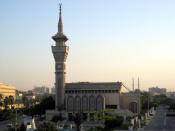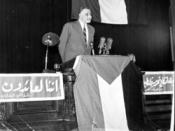In an attempt to restrain requirements of Independent Palestinian State, Israel has banked heavily on its armed forces since the Arab-Israeli War of 1967. The U.S. government has backed up Israel as its strategic partner in the Middle East, which has aggravated the resentment of the Arabian countries as well as it triggered the conflict of Israeli-Palestinian among the most annoying and severe diplomatic troubles since Second World War. An analysis of United States role pertaining to the peace process of Middle East exhibits how the U.S. colligated its concerns to those of Israel, and, by acting so, has unable to devise a durable peace in the region.
Zionist movement boosting the administration of a Jewish land in Palestine that developed in the 1890s, instantly appealed an ample following (Peretz, 1996, pp. 7-8). Initially, Americans looked at Zionist movement as "just a small political cluster of people" that just contended with the internal matters of the Jews (Neff, 1945, pp.
8). That altered when Louis D. Brandeis came forth as the leader of American Zionist movement. Though he stepped down from his job after being nominated to the U.S. Supreme Court by President Thomas Woodrow Wilson in 1916, he persisted as powerful under-the-table representative boosting Jewish concerns in the America (Neff, 1945, pp. 10-13).
The years of war observed American assistance for Zionist movement greater than before. The ZOA (An organization for Zionist movement in America) promptly ascended to 200,000 supporters after US Congress and President Harding announced their full assistance for the Balfour announcement (Neff, 1945, pp. 12-13). During the period of thirties, Stephen Samuel Wise, chairman of the organization for Zionist movement, set about a cruel movement to boost the administration of a Jewish region in Palestine. With the assistance of Abba Hillel Silver, Stephen Samuel Wise pushed...


